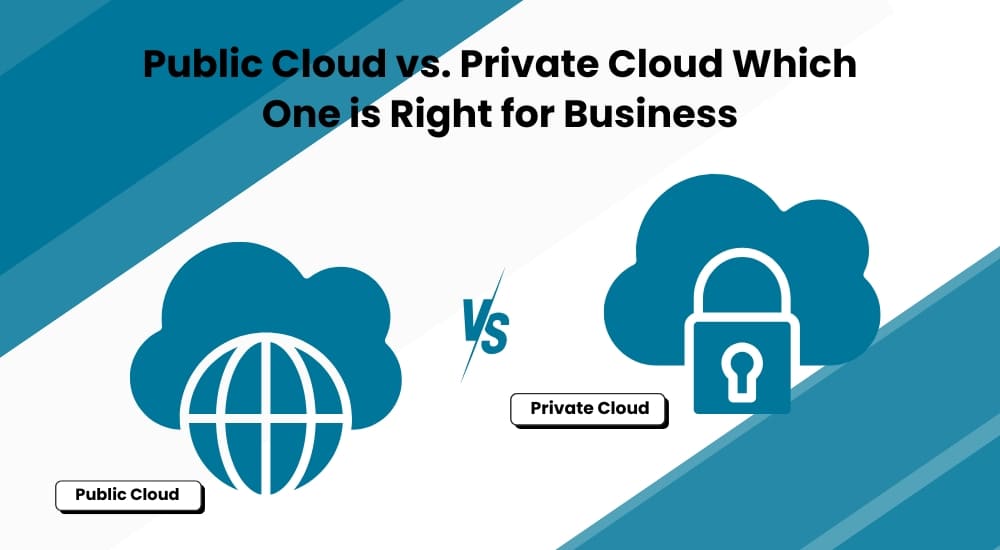
Public Cloud vs. Private Cloud: Which One is Right for Business
Recently, cloud solutions have been increasingly adopted by organizations, and a choice between a public or private cloud environment has become a central business decision. Both models have key advantages in different operational requirements, budgets, and compliance.RealCloud has simplified that decision-making process with flexible, scalable, and secure cloud solutions that help you determine what meets the strategic objectives of your business.
Table of Contents
TogglePublic Cloud: Designed for Flexibility and Scalability
The public cloud is a multi-tenant environment provided by third-party service vendors. Businesses share resources like storage, computing power, and applications, which are delivered over the Internet. This model is useful for startups, small businesses, and organizations with dynamic workloads.
Key Benefits of Public Cloud
- Cost Efficiency: Public cloud is sold based on an OPEX model, where you only pay for what you use, meaning the entry cost to the cloud is almost zero. Clients only purchase what they use in the business world.
- Unmatched Scalability: Cloud resources that are available in the public domain can be rapidly scaled up or down in response to changes in business requirements. One of the significant advantages is flexibility as it allows businesses to deal with seasonal traffic and any other sudden overload.
- Global Accessibility: AWS, Microsoft Azure, and Google Cloud provide huge networking spread centers globally enabling their operations to make happen without any hurdle and with high availability.
Private Cloud: Prioritizing Control and Security
Private cloud is a single-tenant environment and dedicated resources are used solely for one organization. It can be deployed on-premises or managed by a third-party provider. In case when companies require greater levels of control, customizability, and security, then it is a suitable model.
Key Benefits of Private Cloud
- Improved Security: Private clouds provide resource differentiation, which means that prone data is not opened up to common threats from the global village. This makes them suitable for industries that include finance, health, and government.
- Customization: Private cloud computing, on the other hand, can be tailored to meet specific organizations’ operating and legal concerns; this will allow more freedom than the general public solutions associated with an open cloud.
- Keeping up with Regulations: Built-in environments make it very convenient to follow GDPR, HIPAA, or even PCI DSS requirements in the easiest way.
Reliable Performance: Private clouds do not allow a degree of sharing of resources meaning that key applications will always get the performance expected of them.

Public vs. Private Cloud: A Comparative Analysis
Aspect | Public Cloud | Private Cloud |
Cost | Low upfront costs, pay-as-you-go model | Higher setup costs, predictable expenses |
Scalability | High, but in a shared environment | Limited to private infrastructure |
Security | Moderate, shared resources | High, exclusive resources |
Customization | Standardized solutions | Fully customizable |
Compliance | Suitable for general use | Ideal for compliance-heavy industries |
Choosing the Right Cloud for Your Business
Choosing between the various models is something that depends on your business needs, available resources, and the company’s development plan. Here’s a detailed guide to help you decide:
1. Assess Your Business Needs
- Scalability: The flexibility provided by the public cloud is one of its greatest advantages if you have highly variable workloads. For instance, an e-commerce firm with fluctuating traffic during different seasons is better off due to the scalability that comes with its public cloud.
- Security: For an organization working with customers’ private data, intellectual property, or vital applications, the private cloud provides an excellent security system that meets the recommended standards.
- Performance: Organizations that demand reliability and performance guarantees including banks operating trading applications prefer private cloud solutions.
2. Evaluate Budget Constraints
- Public Cloud: They have a flexible plan to pay based on usage, especially favourable for start-ups, small businesses, or organizations with low capital expenditure allowances. It is also preferable for low-cost organizations since there are no costs related to hardware.
- Private Cloud: Despite the higher costs of hosting in private clouds, these clouds have a known operational cost and are considered long-term investments in control, security, and compliance.
3. Consider Your Industry
- Compliance-Driven Sectors: Sectors that are very sensitive to data protection laws such as the healthcare, financial, and legal industries often opt for the extra security and private cloud.
- General Use Cases: Public cloud users in retail businesses, entertainment, and digital service industries have the benefits of scalability as well as low cost.
4. Plan for Growth and Innovation
- Future-Proofing: Public clouds are highly suitable for delivering fast business expansion because businesses do not have to purchase extra capacity they will unlikely use. They also allow companies to adopt trends such as AI, machine learning, and IoT as they do not need to overhaul infrastructure significantly.
- Long-Term Stability: Private clouds are beneficial to span several needs of enterprise organizations because they provide reliable efficiency and protection to organizations that tend to work in set and known conditions.
Conclusion: Balancing Cost, Security, and Scalability
The decision between public and private cloud solutions ultimately depends on your business’s specific requirements. Public clouds shine with their scalability, cost-effectiveness, and global reach, while private clouds excel in security, compliance, and performance consistency. For organizations that cannot commit entirely to one model, the hybrid cloud presents a flexible alternative that combines the best of both. By carefully evaluating your needs, resources, and long-term goals, you can choose a cloud model that supports innovation, efficiency, and growth. Whether it’s the cost-efficiency of a public cloud, the control of a private cloud, or the versatility of a hybrid model, the right solution is within reach.
Frequently Asked Questions
Public clouds are shared by many users, while private clouds are used by one business only.
The public cloud is more affordable because you only pay for the resources you use.
Yes, private clouds offer more control and security since they are not shared.
Yes, a hybrid cloud lets you use both, combining flexibility and security.
The public cloud is ideal because it can quickly scale up or down as needed.